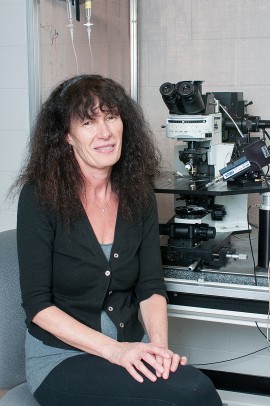Breaking ground

Janet Richmond: Research examines “the basis for learning.” Photo: Joshua Clark/UIC Photo Services
The University Scholars Program, now in its 28th year, honors faculty members for superior research and teaching, along with great promise for future achievements. The award provides $10,000 a year for three years.
In the field of cell biology, Janet Richmond is a groundbreaker.
She studies the molecular mechanisms that control chemical signaling from neurons, a process known as synaptic transmission.
“These chemical signals relay information from our environment via sensory neuron inputs to our brains, where they are integrated to provide output commands that produce appropriate behavioral responses,” explained Richmond, professor of biological sciences. “Changes in these circuits, based on experience, are thought to be the basis for learning.”
Richmond’s work exploring the key mechanisms in learning and memory functions has received international attention, with articles published in prestigious journals and continuous funding from the National Institutes of Health.
She’s now studying the learning behavior of fruit flies and the role of the protein tomosyn in nerve-signal regulation. Her findings, that the protein can affect learning and memory, could lead to new treatments for human memory loss.
Richmond’s interest in biology comes from an early fascination with animal behavior and a high school teacher who “brought the subject to life.” As an undergraduate student at the University of Sussex, she chose an emerging program in neuroscience. This brought her valuable research opportunities, since there were few students majoring in the subject.
“I realized I loved recording neuronal activity in real-time, a form of instant gratification that set me on the career path that I have followed ever since,” she said.
That path includes a doctorate in neurophysiology from the University of Calgary and a career with stops in Honolulu, Salt Lake City and UIC, where she has been based since 2002. Richmond said collaborations with talented colleagues, along with diverse and talented students, make UIC a gratifying place to work.
“It’s extremely rewarding to mentor students and watch them develop skills, confidence and excitement about their research projects or degrees,” she said. “The supervision of graduate students in particular is a real pleasure, somewhat akin to watching your own children grow up and become independent.”
While the balance between teaching, advising and research can be a challenge; Richmond remains actively engaged in lab work.
“I am still as excited by new results as I have always been,” she said. “There is nothing more stimulating than talking over data with my students as we try to put new observations into the big picture of how synaptic transmission works.”
Other University Scholars:
Michael Cho tinkers with biology
Vladimir Gevorgyan simplifies complexities
E. Douglas Lewandowski focuses on the heart
Constantine Megaridis changes interactions
